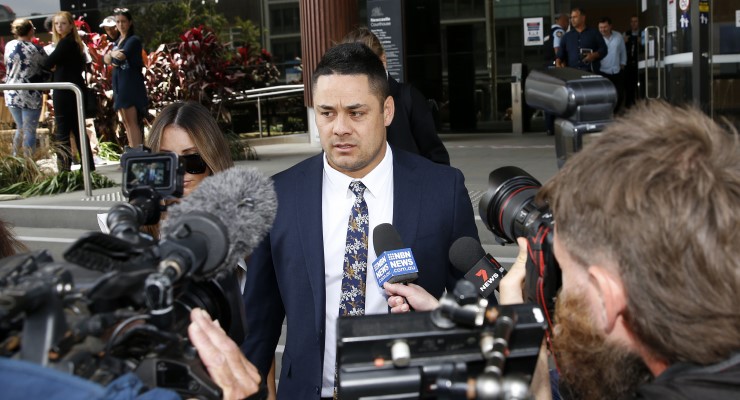
The following article discusses sexual assault.
Two high profile rugby league players (State of Origin heroes, no less). Two rape trials. Two hung juries. Probably not surprising that 2020 would deliver such a non-result, but it smacks of something more than coincidence that the cases of both Jack de Belin and Jarryd Hayne will have to go to retrial next year after their juries failed to reach a unanimous (12-0) or majority (11-1) verdict either way.
I am not suggesting anything untoward with respect to the juries or conduct of the trials and, as the cases remain sub judice, I have nothing to say about the particulars of either case. My interest is in what the outcomes say about the legal system response to allegations of sexual assault.
I can say that the allegations against de Belin and Hayne had certain features that commonly present themselves: the alleged assaults took place in private settings, and there were no witnesses. In rape trials, those contextual factors reduce the case to a fight over three overlapping factual questions: did it happen at all; was it consensual; if it wasn’t, did he know that?
These questions are all, at the end of the day, a he said/she said contest. The nuances around them differ from state to state, most of which maintain some form of defence for an accused who believed, honestly but wrongly, that his victim had consented.
When combined with the structural form of a rape trial — the complainant must give evidence but the accused has the right to remain silent — this tends to focus the case on what the alleged victim did or did not say or do.
In that context, reasonable doubt is often easy for a jury to find. The burden of proof for the prosecution is correspondingly hard to overcome.
Where there is no objectively locatable truth, because the only evidence in either direction is what the accused or the complainant says happened (or didn’t), or what their state of mind was (or wasn’t), then pity the poor jury trying to decide who is telling the truth. A hung jury is not a surprising result, with awful consequences for everyone.
The criminal justice system is built on the principle that, because it is theoretically so difficult to convince 12 strangers that a person is guilty of a crime beyond reasonable doubt, an innocent person should only rarely be convicted.
That proposition is sacrosanct in our inherited legal tradition, so much so that any suggestion for modifying it meets with considerable horror.
Fair enough, except for two things. First, our system isn’t the only one, so it’s not really sacrilegious to ask whether we might look at alternatives. Secondly, for the very particular category of crimes involving sexual violence, it doesn’t work.
The latter is a factual conclusion based on statistical realities. Sexual violence is, as it has always been, endemic in society, but the rates of reporting, prosecution and conviction are negligibly low.
Unless women are just constantly lying about this, criminal sexual violence happens at a rate that renders the actual likelihood of a perpetrator being successfully prosecuted close enough to nil.
There are many reasons for this disconnection, but we know that a key factor is the compound experience of victims from the moment they make a police complaint. In particular, their exposure to repeated re-traumatisation through the legal process, combined with the justified sense that the focal point of a rape trial is on their own actions and omissions rather than those of the accused, is a potent deterrent to saying anything at all.
These matters are essentially a product of the system itself, rather than lack of sympathetic handling by police and prosecutors or vicious cross-examination by defence counsel (not that those are irrelevant or no longer problematic).
The system dictates that the process is an adversarial contest between prosecution and defence, in which one side must prove guilt beyond reasonable doubt, while the other does all it can to undermine the chances of that being achieved.
It would be worth considering a radically different approach to this category of crime. Such an approach would be focused not on what is effectively a trial by ordeal for the accuser which they must survive intact for there to be a chance of conviction, but on an impartial inquiry to determine the truth.
When there is no evidence of the truth except what humans say, then the clearest path to the truth is by requiring everyone who was there to say what happened. The burden for conviction can still sit beyond reasonable doubt. The presumption of innocence remains; what goes is the right to silence.
The rugby league retrials will proceed on the current adversarial principle, and hopefully this time produce results. But I believe that we could get to a more reliable — and far less harmful — outcome in such cases by different means. We should be talking about it.
Does the justice system need reform to deal with sexual assault cases better? Let us know your thoughts by writing to letters@crikey.com.au. Please include your full name to be considered for publication in Crikey’s Your Say column.
If you or someone you know is impacted by sexual assault or violence, call 1800RESPECT on 1800 737 732 or visit 1800RESPECT.org.au.








Crikey encourages robust conversations on our website. However, we’re a small team, so sometimes we have to reluctantly turn comments off due to legal risk. Thanks for your understanding and in the meantime, have a read of our moderation guidelines.